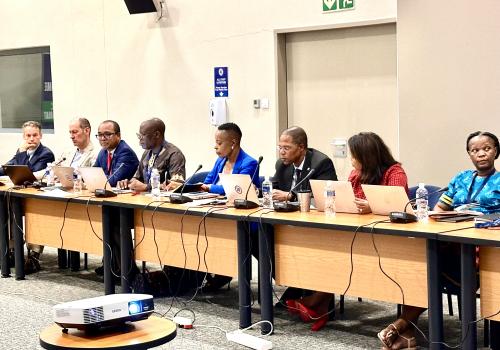The Southern African Development Community (SADC) continues to register good progress on implementation of its programmes to deepen regional economic integration, in particular in the area of Trade, Industry, Finance, and Investment (TIFI). This emerged out of the TIFI Thematic Group meeting held on 29 February 2024 at SADC Headquarters in Gaborone, Botswana. The meeting was co-chaired by Mr Sadwick Mtonakutha, Director of Finance, Investment and Customs (FIC) at the SADC Secretariat, and Ms Annelene Bremer, Counsellor for Development Cooperation from the Embassy of the Federal Republic of Germany to Botswana and SADC.
Steady progress has been made on capacity building on Industrialisation as well as in enhancing private sector participation in regional value chains. For instance, following the capacity building through the Enhancing the Quality of Industrial Policies (EQuIP) methodology, the Kingdom of Eswatini, the Republics of Zimbabwe, and Malawi have launched their new industrial policies aligned with the regional strategy.
On the other hand, the Support towards Industrialisation and the Productive Sectors in the SADC region (SIPS), a programme coordinated by the SADC Secretariat and implemented by the Deutsche Gesellschaft für Internationale Zusammenarbeit (GIZ), successfully achieved the following results in terms of private sector participation in regional value chains:
164 persons employed in cooperating/ beneficiary companies in Regional PharmaMedTech and Leather value chains;
Over 290 visits to networking meetings, workshops, trade fairs and B2B meetings of companies/organisations from the same value chains have been supported;
Over 690 persons from beneficiary companies/organisations have been trained in project management/operations and other related disciplines;
Over 150 companies have been provided with information on suitable and affordable financing options for manufacturing in the SADC region; and
12 companies have been supported to achieve international standards for environmentally sustainable production.
In the area of Trade, 12 Member States are now part to the SADC Protocol on Trade in Services following the recent accession of the United Republic of Tanzania to this legal instrument. The meeting noted that negotiations for phase II services sectors (business services, including professional services and computer services, educational services, distribution services, environmental services, recreational, cultural and sporting services, health-related and social services and other services not included elsewhere) are planned to be launched in April 2024. Efforts are also ongoing to consolidate implementation of the SADC Free Trade Area (FTA). The SADC FTA members are Botswana, Eswatini, Lesotho, Madagascar, Malawi, Mauritius, Mozambique, Namibia, Seychelles, South Africa, United Republic of Tanzania, Zambia and Zimbabwe. Angola and DRC are yet to join the SADC FTA.
On the Finance sector, the meeting noted that the SADC Anti-Money Laundering/Countering the Financing of Terrorism (AML-CFT) Committee has been operationalised following its inaugural meeting held in South Africa in February 2024. The meeting also noted that the development of a Discussion Paper with options to operationalise the SADC Regional Development Fund (RDF) is underway. This paper will be submitted to Ministers of Finance and Investment at their extra-ordinary meeting planned for April 2024.
However, despite this good progress, the meeting noted that SADC economic integration is still being hampered by three binding constraints - inadequate and poor-quality infrastructure, a severe deficit of the skills needed for industrial development and insufficient finance. It is against this background that Mr Dhunraj Kassee, Director of Industrial Development and Trade at the SADC Secretariat made an appeal to the International Cooperating Partners (ICPs) to strengthen collaboration and provide further support on the following strategic issues: issues at the Kasumbalesa Border Post, ongoing efforts towards COMESA-EAC-SADC Tripartite Free Trade Area Agreement, and the review of the SADC Industrialisation Strategy and Roadmap.
The TIFI Thematic Group plays a central role in the implementation of the Regional Indicative Strategic Development Plan (RISDP) Prioritised Projects which aim at delivering maximum impact on the standard and quality of life of the people of Southern Africa. It provides a platform to facilitate interactions between SADC and the ICPs active in the SADC economic integration agenda. Among others, the overall purpose of the group is to serve as:
a forum for coordinating activities to avoid overlaps and achieve maximum synergies and complementarity of assistance provided,
a forum for exchanging ideas and enhancing dialogue on strategic issues related to the implementation of the TIFI Business Plans, and
a resource mobilization (financial, knowledge and other) mechanism on funding gaps and coordinate utilisation of secured funding.

